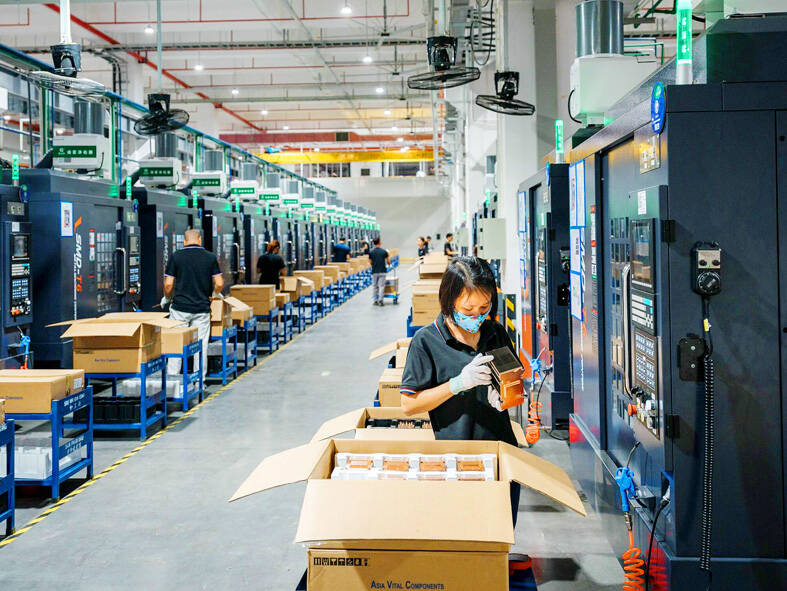Companies have been moving factories from China to Southeast Asia, anticipating that US president-elect Donald Trump would slap high tariffs on Beijing, industrial park developers in the region say.
Trump, who won a resounding victory on Tuesday, has threatened 60 percent tariffs on goods coming into the US from China, much higher than the levies of 7.5 percent to 25 percent he imposed in his first term, a major risk for the world’s second-largest economy.
Southeast Asia — with auto and electronics factories from Thailand to Vietnam and Malaysia — would likely benefit at China’s expense, said two executives, two business groups, a lawyer and an analyst in the region.

Photo: Bloomberg
Developers of industrial parks are adding Chinese speakers and preparing land tracts for factories, a sign of how Trump, who takes office in January, could reshuffle global supply chains.
As Trump geared up his campaign to retake the presidency earlier this year, calls from Chinese customers flooded WHA Group, one of Thailand’s largest industrial estate developers, company CEO Jareeporn Jarukornsakul said.
“There was (already) a relocation to Southeast Asia, but this round is going to be more intense,” she said, referring to Trump’s 2017 to 2021 first term.
WHA is expanding its sales force and adding Chinese speakers to teams overseeing maintenance and administration of industrial parks spanning more than 12,000 hectares in Thailand and Vietnam, Jareeporn said.
Of the 90 factories that have opened this year in industrial parks run across Southeast Asia by Thailand’s Amata Corp PCL, about two-thirds have been companies relocating facilities from China, company founder and chairman Vikrom Kromadit said.
Trump would be a “big punch” to China, potentially doubling the number of firms looking to move from there into Amata’s 150km² of industrial estates in four Southeast Asian countries, Vikrom said.
Construction begins this month on an Amata industrial park in Laos, where China has built a high-speed rail line connecting Kunming in southwestern China to the Laotian capital Vientiane, he said.
Thailand, a regional automobile manufacturing hub, has drawn more than US$1.4 billion in investment from Chinese automakers into its fast-expanding electric vehicle industry.
“We want a lot of investment from China so we can sell to America,” Thai Minister of Commerce Pichai Naripthaphan said.
“I believe this will happen,” he told reporters on Thursday. “The Americans love us, the Chinese love us — we don’t have to choose sides.”
Malaysia, hoping to draw more than US$100 billion in new investments to its semiconductor sector, could benefit from a realignment of supply chains, said leaders of two business groups.

On Tuesday, US President Donald Trump weighed in on a pressing national issue: The rebranding of a restaurant chain. Last week, Cracker Barrel, a Tennessee company whose nationwide locations lean heavily on a cozy, old-timey aesthetic — “rocking chairs on the porch, a warm fire in the hearth, peg games on the table” — announced it was updating its logo. Uncle Herschel, the man who once appeared next to the letters with a barrel, was gone. It sparked ire on the right, with Donald Trump Jr leading a charge against the rebranding: “WTF is wrong with Cracker Barrel?!” Later, Trump Sr weighed

HEADWINDS: Upfront investment is unavoidable in the merger, but cost savings would materialize over time, TS Financial Holding Co president Welch Lin said TS Financial Holding Co (台新新光金控) said it would take about two years before the benefits of its merger with Shin Kong Financial Holding Co (新光金控) become evident, as the group prioritizes the consolidation of its major subsidiaries. “The group’s priority is to complete the consolidation of different subsidiaries,” Welch Lin (林維俊), president of the nation’s fourth-largest financial conglomerate by assets, told reporters during its first earnings briefing since the merger took effect on July 24. The asset management units are scheduled to merge in November, followed by life insurance in January next year and securities operations in April, Lin said. Banking integration,

LOOPHOLES: The move is to end a break that was aiding foreign producers without any similar benefit for US manufacturers, the US Department of Commerce said US President Donald Trump’s administration would make it harder for Samsung Electronics Co and SK Hynix Inc to ship critical equipment to their chipmaking operations in China, dealing a potential blow to the companies’ production in the world’s largest semiconductor market. The US Department of Commerce in a notice published on Friday said that it was revoking waivers for Samsung and SK Hynix to use US technologies in their Chinese operations. The companies had been operating in China under regulations that allow them to import chipmaking equipment without applying for a new license each time. The move would revise what is known

Artificial intelligence (AI) chip designer Cambricon Technologies Corp (寒武紀科技) plunged almost 9 percent after warning investors about a doubling in its share price over just a month, a record gain that helped fuel a US$1 trillion Chinese market rally. Cambricon triggered the selloff with a Thursday filing in which it dispelled talk about nonexistent products in the pipeline, reminded investors it labors under US sanctions, and stressed the difficulties of ascending the technology ladder. The Shanghai-listed company’s stock dived by the most since April in early yesterday trading, while the market stood largely unchanged. The litany of warnings underscores growing scrutiny of